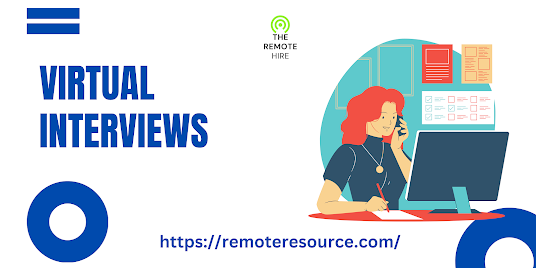Bridging the Gap: Helping Old-School Executives Embrace Virtual Interviewing
As entrepreneurs and small business owners
continue to navigate the ever-evolving landscape of the modern workplace, they
are constantly seeking new and innovative ways to expand their talent pool and
establish a decentralized workplace. However, if you are having trouble convincing
your old-school executives and upper management to embrace virtual interviewing and remote employees, be rest assured that you are not the only one.
Many SMBs face the challenge of bridging the generation gap and adapting to the new reality of remote work. To effectively persuade these traditionalists, it's important to highlight the numerous benefits of working with virtual employees, while simultaneously providing them with the necessary tools and support to help transition their approach to hiring.
Here are some methods on how you could get
old-school executives to be more open to virtual interviewing:
Explain The Benefits
Virtual interviews are the new norm in the
hiring process, and it has become more prevalent since the pandemic started.
Companies have realized that virtual interviews are a cost-effective and
time-saving way of interviewing candidates. SMBs, in particular, benefit from
virtual interviews as they do not have the resources to fly in candidates for
interviews or even arrange for a conference room to conduct interviews. Virtual
interviews have made the hiring process more efficient, and it is a great way
to get a larger pool of candidates.
One of the most significant benefits of
virtual interviews is that they allow companies to access a larger pool of
candidates. Traditional interviews are limited by geographical location, which
can be a significant barrier to finding the best candidates. With virtual
interviews, companies can interview candidates from anywhere in the world. This
opens up a wider pool of candidates and allows companies to find the best
talent, regardless of where they are located. This can be particularly
beneficial for SMBs that may be located in areas with a limited pool of
qualified candidates.
Virtual interviews also help companies
save money, which is particularly important for SMBs. With virtual interviews,
there is no need to rent a conference room or pay for travel and
accommodations. Companies can save money on these expenses, which can be
reinvested in other areas of the business.
In addition to the cost savings, virtual
interviews are also more convenient for both the interviewer and the
interviewee. Virtual interviews allow the interviewer to conduct the interview from
anywhere, as long as they have an internet connection. It also allows the
interviewee to participate in the interview from anywhere, which is
particularly beneficial for candidates who are located in different time zones.
Provide Training and Support
One of the biggest barriers to executives embracing
virtual interviewing is their lack of experience with technology. Many of them
may not be comfortable with using video conferencing software or other digital
tools, and they may feel overwhelmed by the prospect of conducting an interview
remotely. Therefore, providing training is an excellent way to ease their fears
and help them become more familiar with the process.
The training sessions should cover the
basics of virtual interviewing, including how to use video conferencing
software and other digital tools, how to set up a virtual interview room, and
how to conduct an effective interview remotely. It is also essential to provide
them with best practices for virtual interviewing, such as making eye contact
with the candidate, checking their body language, and maintaining a
professional demeanour throughout the interview.
Virtual interviews can also be stressful
for the interviewee. They may be unsure of what to expect, and they may feel
that the lack of in-person interaction makes it more difficult to connect with
the interviewer. Offering support to the interviewee can help to alleviate
these concerns.
One way to offer support to the
interviewee is to provide them with information on what to expect during the
virtual interview. Providing them with a detailed agenda of the interview,
including who they will be speaking with and what topics will be covered, can
help to ease their anxiety. Additionally, providing them with the interviewer's
contact information and encouraging them to reach out if they have any
questions or concerns can help to put their minds at ease.
A great way to help the interviewee is to
offer them a mock interview. This can help to prepare them for what to expect
during the actual interview and give them an opportunity to practice their
responses. It can also help to build their confidence and make them feel more
prepared.
Use a Familial Platform
Virtual interviews can also be stressful
for the interviewee. They may be unsure of what to expect, and they may feel
that the lack of in-person interaction makes it more difficult to connect with
the interviewer. Offering support to the interviewee can help to alleviate
these concerns.
One way to offer support to the
interviewee is to provide them with information on what to expect during the
virtual interview. Providing them with a detailed agenda of the interview,
including who they will be speaking with and what topics will be covered, can
help to ease their anxiety. Additionally, providing them with the interviewer's
contact information and encouraging them to reach out if they have any
questions or concerns can help to put their minds at ease.
Another way to provide support to the interviewee is to offer them a mock interview. This can help to prepare them for what to expect during the actual interview and give them an opportunity to practice their responses. It can also help to build their confidence and make them feel more prepared.

.jpg)









Comments
Post a Comment